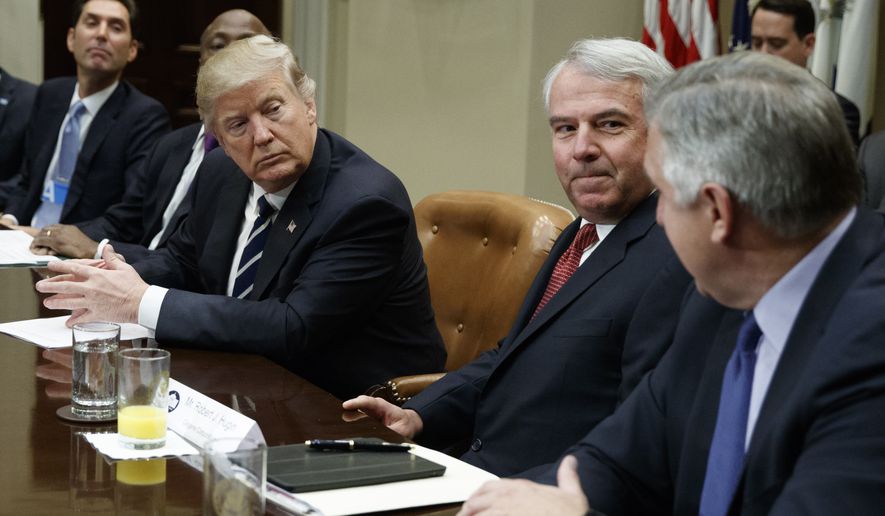President Trump told pharmaceutical executives Tuesday he wants to lower the price of drugs purchased by the government, and he pledged that his administration will speed up approval times for new medicines.
“You folks have done a terrific job over the years, but we have to get prices down for a lot of reasons,” Mr. Trump said at the White House. “We have no choice. For Medicare, for Medicaid, we have to get the prices way down.”
The president urged the executives around a conference table to bring back their manufacturing operations to the U.S., promising to cut regulations and speed up the Food and Drug Administration’s consideration of new drugs. He said it’s “disgraceful” that companies spend on average $2 billion to develop a drug and can wait as much as 15 years for a final decision by the FDA.
“We’ll also be streaming the process so that, from your standpoint, you can actually get a drug approved if it works, instead of waiting many, many years,” the president said.
Democratic lawmakers have tried to enact price negotiations for drugs under Medicare, and Sen. Bernard Sanders, Vermont independent, gave qualified support for Mr. Trump’s comments. He said he plans to introduce legislation soon to allow Medicare to negotiate for lower drug prices.
“I look forward to working with President Trump on this issue if he is serious about standing up to the pharmaceutical industry and reducing drug prices,” Mr. Sanders said.
But Rep. Rosa DeLauro, Connecticut Democrat, called the president’s plan to speed up approval of new drugs “dangerous.”
“Millions of Americans across the country rely on the FDA to ensure that the drugs that they take each day are safe and effective,” she said. “These regulations are in place for a reason. When lives are at stake, it is an outrage that President Trump would consider putting the profits of pharmaceutical corporations ahead of safety.”
The pharmaceutical industry was put on notice by Mr. Trump before he took office in early January, when he warned the drug companies are “getting away with murder” with their pricing in the U.S.
“U.S. drug companies have produced extraordinary results for our country, but the pricing has been astronomical for our country,” Mr. Trump said Tuesday. “We have to do better.”
Addressing concerns that potential changes could cut into drug companies’ profits, Mr. Trump said the manufacturers will benefit from lower taxes and less red tape.
“We can save tens of billions of dollars, and you people are going to do great,” he told the executives. “I want you to manufacture in the United States. We’re gonna be lowering taxes, big league, we’re going to be getting rid of regulations that are unnecessary, big league.”
The president also said he will insist on trade deals that require other countries to “pay their fair share” of drugs manufactured by U.S. companies.
“We’re going to be ending global freeloading,” Mr. Trump said. “Foreign price controls reduce the resources of American drug companies to finance drug and R&D innovation. Right now, it’s very unfair what other countries are doing to us.”
He said the U.S. has been losing out in the drug market to other countries devaluing their currencies.
“Our country has been run so badly, we know nothing about devaluation,” he said. “You look at what China’s doing, you look at what Japan has done over the years. They play the money market, they play the devaluation market and we sit there like a bunch of dummies.”
Whether or not he wants to change policy, Mr. Trump also said he’s long been “disturbed” by the government not allowing terminal patients to receive experimental drugs.
“They come up with a new drug for a patient who’s terminal, and the FDA says, ’We can’t have this drug used on the patient,’ but they say that the patient within four weeks will be dead,” Mr. Trump said. “So we’re gonna be changing a lot of the rules.”
Among the drug-company executives who attended the meeting were Robert Bradway of Amgen, who said the company is adding 1,600 jobs in the U.S. this year; Joaquin Duato of Worldwide Pharmaceuticals, Johnson & Johnson; Kenneth Frazier of Merck; Robert Hugin of Celgene; Joseph Jimenez of Novartis; David Ricks of Eli Lilly; and Stephen Ubl of the PhRMA lobbying group.
• Dave Boyer can be reached at dboyer@washingtontimes.com.




Please read our comment policy before commenting.